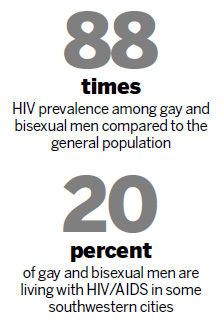Gay men hit hard by HIV/AIDS
Updated: 2011-07-11 07:13
By Shan Juan (China Daily)
|
|||||||||||
BEIJING - Gay and bisexual men account for around one in every three new cases of HIV in China, according to the latest official statistics released by the Ministry of Health.
| ||||
The problem is particularly acute in large urban centers, with the prevalence rate in some southwestern cities reaching almost 20 percent.

However, the statistics also show that less than half of all gay and bisexual men have access to HIV screening, while about 15 percent of those who are infected are not receiving treatment.
"Cities are at the heart of China's development and progress and must remain at the forefront of its HIV response," said Michel Sidibe, executive director of the Joint United Nations Programme on HIV/AIDS (UNAIDS), during a workshop about the HIV impact on MSM on Saturday in Chengdu, capital of Southwest China's Sichuan province.
"Through bold action cities can lead the way to achieving the UNAIDS vision of zero new HIV infections, zero discrimination and zero AIDS-related deaths," he said, according to a UNAIDS news release. "We hope that over the next year, many more Chinese cities will implement MSM strategies."
Almost 10 percent of gay and bisexual men in Chengdu are HIV-positive, according to Yang Xiaoguang, director of the city's health bureau. He agreed with Sidibe that cities have a crucial role to play in AIDS prevention and added: "By working to build a strong, multi-sector response in Chengdu, with meaningful community participation, we can scale-up coverage of prevention, treatment and care services among MSM and halt the spread of HIV."
During the workshop, senior Chinese health officials, representatives from civil societies and other delegates discussed a new five-year strategy that increases coverage of HIV prevention and treatment for the MSM population and promotes the participation of community organizations.
Government estimates put China's population of gay men at between 5 and 10 million, although Zhang Beichuan, a leading expert on HIV at Qingdao University, puts the number closer to 30 million.
Tong Ge, coordinator of China's MSM Health Forum, noted the importance of ensuring strong cooperation between the government and society.
"By building on the experiences of cities like Chengdu, which already have well developed AIDS responses, we can help promote multi-sector collaboration on an equal, orderly basis and strengthen the response to HIV nationwide," he said. "The next step will be to implement similar strategies in other cities nationwide."
Chengdu's new strategy underscores the critical role community organizations can play in reaching MSM and other populations at a higher risk of infection, experts at the workshop said.
In 2009, China had an estimated 740,000 people living with HIV/AIDS, according to UNAIDS statistics.



